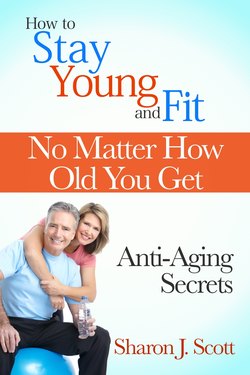Читать книгу How to Stay Young and Fit No Matter How Old You Get: Anti-Aging Secrets - Sharon J. Scott - Страница 5
На сайте Литреса книга снята с продажи.
What is the Aging Process?
ОглавлениеThe minute we are born, we begin to age. Aging is a predetermined process that is programed into our cells. Our DNA is a blueprint of ourselves, and it has the instructions for aging in its helix. We age because our genes tell us too. This is why some people begin to show signs of aging before others.
As we age, we experience degenerative changes to our organs, tissues, bones and our skin. Telemeres are parts of our DNA, located at the ends of our chromosomes. When a cell divides, the telomere shortens; aging the cell and eventually, the cell dies. What happens to us on a cellular level translates what happens to us as a whole, we age and we die.
We cannot stop the aging process, but we can control some factors that influence it. In order to slow down the aging process, we need to understand it first.
Knowing how your body is changing helps you learn how to slow down the aging process, keeping you younger and healthier for longer.
Cardiovascular System
Aging slows down the heart rate and the heart itself will often enlarge. Arteries and blood vessels, especially those in the heart, stiffen so your heart is forced to work harder. This contributes to high blood pressure and a whole host of age related cardiac problems.
Muscles, Bones, and Joints
Bones lose density and they shrink slightly. As we age, we shorten slightly. Shrinking bones and a loss of bones density increase the probability of breaks and fractures as the bones become brittle. Muscle flexibility declines as does muscle strength causing overall weakness and balance issues. Coordination begins to decline. Joints lose their natural lubrication as cartilage wears down, causing arthritis and inflammation.
Digestive System
Constipation is a common problem as the digestive system begins to slow. Medications can contribute to this, as well as not being hydrated enough, not being active enough or not getting a proper diet. As we age, those are all common factors and it can affect the digestive system.
Urinary Tract
Weakened muscles in the pelvic floor can cause urinary incontinence and partial to full loss of bladder control can happen. For men, as their prostrate enlarges with age, it causes incontinence as well and for women, menopause has the same effect. Kidneys no longer work as efficiently, allowing toxins to build up in the blood.
Memory
As we age, we start to lose our memory. Although some age related illnesses greatly affect the memory, it is normal to begin to lose our memory as we age. Remembering new things becomes difficult and even trying to come of words that we know can be challenging.
Ears and Eyes
Our vision weakens with age and cataracts are common. Focus becomes harder, especially up close and the glare from lights can be more bothersome as you age. We lose our ability to hear higher frequencies and indeed, our hearing as a whole begins to decline.
Skin
Our skin loses its elasticity so it sags and is more fragile. The skin itself is thinner and bruises form easily. We produce less natural oil as we age so it makes our skin drier and skin tags, age spots and wrinkles form.
Teeth
Dry mouth is a side effect of many common medications, especially for high blood pressure and this contributes to gum disease. Gums begin to recede, and infection and decay of the mouth becomes more common.
The above are the basics of how aging takes a toll on the body. Knowing how aging targets the body allows us to fight back, warding off the major signs of aging while keeping our body and mind healthy.
